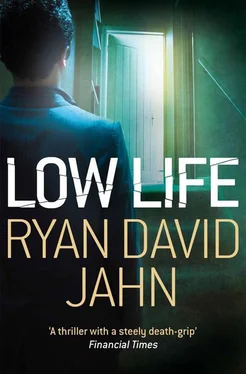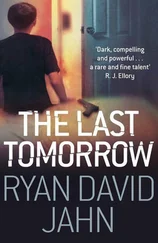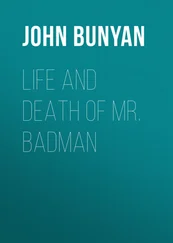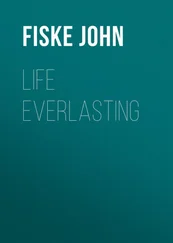‘Okay.’
She put the gum back into her mouth – peeling it off the tip of her finger with her teeth – and turned around to get back to work.
For the rest of his lunch break Simon sat in his cubicle flipping through a newspaper, glancing at headlines to see if anything struck him as worth reading. But it wasn’t a headline that caught his eye; it was a photograph. The picture was of an old man with parentheses stacked up on either side of his mouth, with loose skin hanging below his chin despite the fact that he was thin, with bags under his eyes that could hold a pint apiece. The headline read
GERMAN DIRECTOR HELMUT MÜLLER KILLED
and the piece continued
LOS ANGELES – Controversial German film-maker Helmut Müller, who wrote and directed Nazi propaganda films such as U-Boote westwärts and Kolberg before immigrating to the United States and making such anti-war classics as The Last Coffin and Gunmen Die Too, was found dead outside his Koreatown apartment early yesterday evening, the apparent victim of a mugging. He was ninety-seven years old.
Müller, who hadn’t directed a film since the 1966 box-office and critical failure Hell’s Mouth, had condemned film as being ‘inherently incapable of purity or honesty. He asserted that the ‘dream of an artist is always pure’, in an essay for the now-defunct Los Angeles Free Press, ‘but we contaminate it with our mental illnesses in the act of creation. I do not agree with Freud. I do not believe dreams are evidence of anything; only how we corrupt our dreams when trying to realize them is evidence. The difficulty lies in telling where the dream ends and the corruption begins. Dreams come to us fully formed, as gifts from the gods, and we destroy them. It is best to leave them in the ether where they can remain holy.’ He gave up film-making for good in 1970, after over twenty-seven years and twenty-two films, opting instead to open a restaurant in Sherman Oaks. ‘Feeding people,’ he said at the time, ‘is at least honest work.’ The restaurant closed in 1982, and Müller had since been in retirement.
The Academy of Motion Picture Arts and Sciences had planned on honoring the film-maker with a lifetime achievement award in 2002, but plans were dropped when his previously buried past as a Nazi propagandist was brought to the public eye by protesters. When asked for his response to the Academy’s dropped plans to honor him, he said, ‘I would not honor me. What I have done is unforgivable. I have spent the last fifty-seven years trying to redeem myself. But I do not believe that I have, or that I will before I retire from this earth. But it is a relief that it is out. It was a terrible secret to keep.’
In 2005 Mr Müller spoke at the Los Angeles Film Academy about ‘the importance of telling truth to power, whatever the consequences’, but noted that this advice was ‘coming from the lips of a famous coward. I was worse than silent. I let oppressors and murderers speak through me. This is an unforgivable sin – to allow something as holy as art to be used for evil. Unforgivable.’ This was his last public speech.
All three of Mr Müller’s children are deceased. He is survived by four grandchildren and six great-grandchildren.
Simon read the piece twice, and then folded up the newspaper and dropped it into the trash can under his desk. He looked at the clock. His lunch break was over.
The Pasadena street on which Jeremy Shackleford once lived was just off Colorado Boulevard. It was a quiet, tree-lined strip of pothole-free asphalt dotted with late-model cars, old but well-maintained three- and four-bedroom houses, and green yards. The sidewalks were covered in faded chalk hopscotch etchings and jump-rope scars, and were cracked in a few places by tree roots that had gotten bigger than expected; but the gutters were free of trash – no paper cups and condom wrappers here – the driveways were free of oil stains, and the yards were free of weeds. Despite the sound of traffic from Colorado, the street had an air of calm about it.
Simon drove his old rattling Volvo along the asphalt, glancing from the driver’s license in his left hand, pinched between thumb and index finger, to the numbers painted curbside. He found parking right out front, pulled to the curb, and killed the engine.
Above him, the orange sun shot daggers through the branches of one of the many eucalyptus trees which lined the street, creating a strange pattern of shadows on the car, a natural stencil painted with light.
He looked to his right and saw the Shackleford house through his water-spotted passenger-side window. It was a Craftsman-style building, set at the top of five concrete steps which had been painted green, and half-hidden behind a plant-littered front porch. Basil and rosemary and aloe grew there, as well as ficus and three hanging pots spilling vines dotted with large purple flowers.
He tossed Shackleford’s driver’s license onto the passenger’s seat beside the wallet from which he’d pulled it and stepped out of his Volvo. He did not lock the doors. In this neighborhood he doubted anyone would even glance in the direction of his battered car, and if they did they would no doubt assume it belonged to someone’s maid. Or perhaps someone’s child visiting from USC or UCLA, home so mom could do the laundry.
He walked up the concrete path that cut the green yard in two, made his way up the painted steps, and, standing in front of the door, took a deep breath. He felt nervous and afraid. His chest hurt. His body shook slightly. He doubted anyone would notice just by looking at him, but he could feel it.
He thumbed the doorbell and heard the muffled sound of it chiming inside.
There was no response.
He rang again, and again there was no response, no sound of footsteps rushing to reach the door, no request to hold on just a moment, I’ll be right there, I’m in the kitchen and my hands are full. There was only silence.
He looked over his left shoulder and saw a man of retirement age walking his dog. Or rather, the dog was walking him, leaning forward and pulling the old man behind it on its leash. The old man was paying Simon no attention. And a moment later he was past, being pulled forward by his eager dog while leaning against the force like a man in a windstorm trying to maintain equilibrium. Over his right shoulder, Simon saw a pair of blonde girls, wearing identical flower-print dresses and red ribbons in their hair, hunched over something on their lawn, their backs to him. With those exceptions, the neighborhood appeared to be empty.
And still no one opened the front door.
He rang the doorbell a third time just to be sure.
Then – after a moment – pulled Shackleford’s wad of keys from his pocket. He tried three or four of them before he found the one that could unlock the front door, and with it he did so. He pushed the door open, stepped just inside, and closed it behind him. He put the keys back into his pocket and twisted the deadbolt home.
The house appeared to be empty of life, but it also seemed to be humming; the electricity in here tingled on his skin and in his hair. The living room had polished hardwood floors. The walls were a warm orange, the ceiling a darker version of the same. A flat-panel television hung on the living-room wall above the fireplace hearth, black plastic surrounding a black screen, a small red light glowing in the lower right-hand corner of the frame. The fireplace itself was simply ornamental now, the one-inch stub of gas pipe sticking from the wall capped off long ago. Several candles sat on the bricks in front of it. A plush brown couch sat atop an area rug that was thick and tightly woven. Expensive-looking art hung on the walls. The living room was the size of Simon’s entire apartment.
Читать дальше












